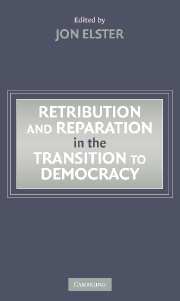PART II - GERMANY AND GERMAN-OCCUPIED COUNTRIES AFTER 1945
Published online by Cambridge University Press: 03 December 2009
Summary
The fall of the German Reich in 1944–45 triggered the most extensive processes of reparation and retribution in the history of transitional justice up to the present. In a first wave, the proceedings focused on war crimes (in Germany) and collaboration (in German-occupied countries). In a second wave, which started in the 1960s and 1970s, the Holocaust began to be seen as the crucial event, leading to new prosecutions and new compensations. It is instructive in this regard to compare the petty compensations offered Jewish slave laborers in the 1950s (Ferencz 2002) with the much larger amounts that were part of the package deal struck with German firms and the German government in 1999 (Eizenstat 2003). With regard to retribution, the trial in Jersualem of Adolf Eichmann (Arendt 1994) was a seminal second-wave event. In France, the prosecution of Maurice Papon for the part he played in the deportation of French Jews was both the effect and the cause of new legal approaches to collaboration.
In Germany, the first wave was itself a succession of separate stages. The first trials of major Nazi figures were conducted by the four-power International War Crimes Tribunal in Nuremberg, whose importance lay not so much in the sentences it handed down as in the new jurisprudence it established. Later, the four occupying powers established separate war crime tribunals and initiated processes of denazification. Finally, these tasks devolved upon the Germans themselves. David Cohen's chapter provides a full survey of these processes and their implications.
- Type
- Chapter
- Information
- Publisher: Cambridge University PressPrint publication year: 2006



